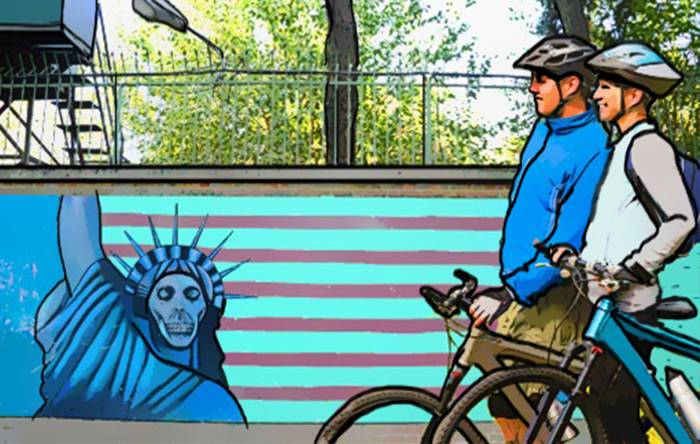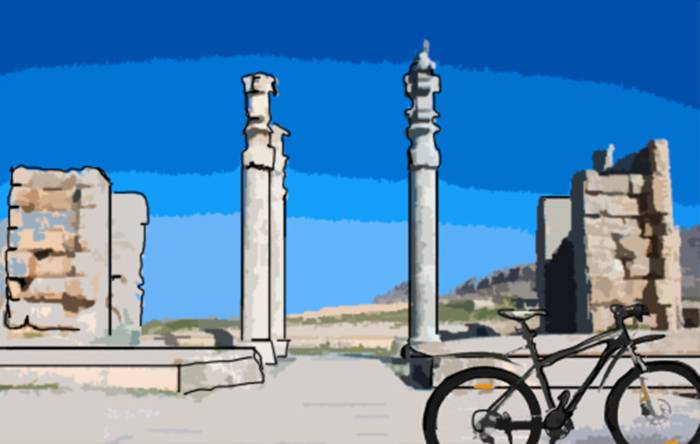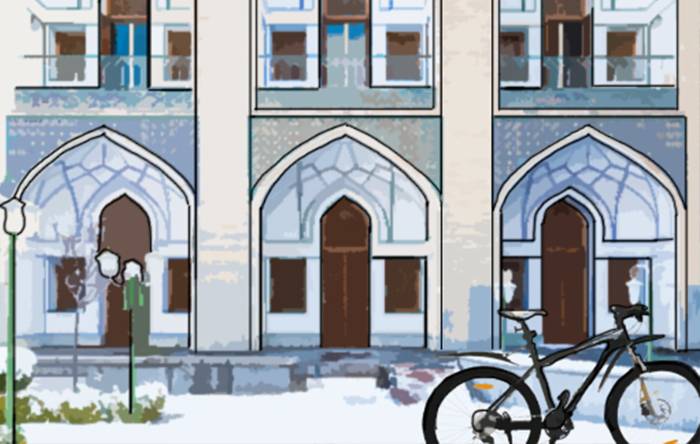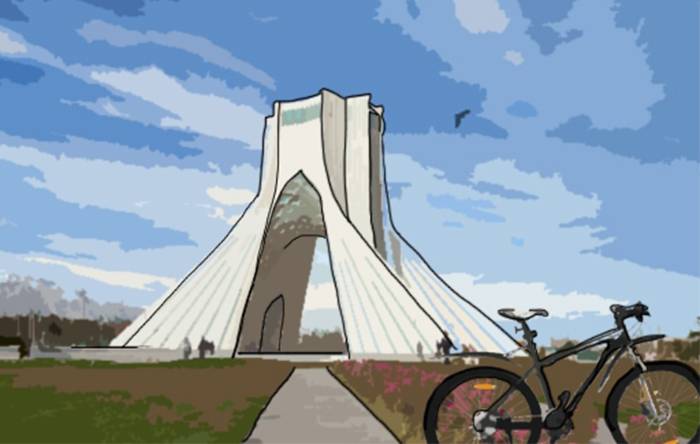There was a swirl of fabric, and all that was left of the women I’d been sitting between on the flight to Tehran were pairs of eyes. The airport crawled with AK47s. At our hotel, the television in the lobby played a montage of British and American military activity against homes and schools, with cutaways to wailing women and children. When we handed our passports to the hotel manager he said, "Ah. British." With perfect timing, the montage on the TV cut to a crazed crowd burning Union Jacks.
Ed, my travel buddy, and I went up to our dingy room and locked the door. This had never happened to us before. We’d arrived in a foreign country, and it really felt foreign. Did we keep a low profile, figure out how to comport ourselves in Iran, this new and strange country? Not really.
The next morning, we attached a video camera to the back of my bicycle, partially hiding it under a coat, and cycled to the hijacked American Embassy – known locally as “The Den of Espionage”. We started to film women in hijab walking past the government-sanctioned anti-American murals on its walls. We thought it would make great holiday video.
The “Den” is now used as a training ground for Iran’s elite Revolutionary Guards, and the ayatollahs are picky about who gets to film it: No one. With our camera-on-back-of-bike-covered-by-coat espionage technique, we looked like quite the inept spies.
Things started off well. I stopped in front of a giant mural of the Statue of Liberty portrayed as an evil skeleton, angled my bicycle-camera combo towards it, and waited for cinematic magic to happen. Then things went wrong. A man in a grey suit walked in front of the camera. I asked him to move out of my shot. He took his own camera out of a pocket and took a photo of my face. He then grasped my wrist and said: “What is your name? You must stay with me now.”

In 1979, 52 Americans were accused of spying and held hostage for 444 days in the building I was attempting to film. I said, “sorry, I need to go now,” wrestled my wrist free, and biked away, zigzagging through Tehran's backstreets. Ed and I were more than a little perturbed. If this guy was secret police, how long would it take him and his buddies to match the photo on my visa with the one he had on his camera? But we put worry out of our minds in the interest of sightseeing. That evening we visited Tehran’s Museum of Contemporary Art. Outside of it we met the gallery’s director, who had just come back from Paris where he’d picked up a Picasso. Inside, we met three twenty-something Iranians – Babak who makes documentaries, Rima who works for Bloomberg, and Bahareh who works for UNICEF. Bahareh asked us what we thought of Iran. We told her about the TV in the hotel lobby, about trying to film the murals on the ‘Den of Espionage’ and me having my photo taken. She tutted, and told us to get into her car.
An hour later, we arrived at a secret house party where we downed vodka and danced to brain-infecting Europop, both of which are illegal in Iran. The girls removed their headscarves as they walked in. As Babak, the documentary filmmaker, twisted his stuff on the dancefloor to the Ibiza classic that goes, "Life is life, na na na na na", he shouted, "What do you think of Iranians now?" We thought Iranians were great.
After six days in Tehran, we had to leave to kick off our cycling tour, and to keep one step ahead of the secret services’ photo recognition team. Looking for two Brits in Tehran is one thing, looking for two Brits on bicycles in bright lycra in remotest rural Iran? Everyone knows that’s like finding two needles in a haystack! We took a bus to the southern city of Shiraz, and decided to inaugurate our trip at nearby Persepolis.

Persepolis is tucked into the corner of a dusty plain backed by scrubby mountains, and in the pantheon of ancient ruins, it ranks with the pyramids. It dates back to 514BC while we in Britain were still working out what to do with this new stuff, iron. It’s got the “Apadana Palace,” the “Hall of a Hundred Columns,” and the "Tomb of the King of Kings.” Ed and I were impressed. In front of “The Gate of Nations” we took a ceremonial photo and shook hands. We each made a speech. Then the cycling started, Tour de France style. We raced out of the palace complex, round the first bend, up the first hill. “Woo hoooo! Next stop Esfahan baby! We are readdddddy to rooooollllll!"
We then got to a crossroads. I asked Ed which way. He didn’t know. Our map of Iran, bought in Covent Garden is 1:xxxxxxx. It shows us that there are less than twenty roads in Iran, and that Persepolis doesn’t exist. Right. Standing with us at the crossroads was a man with a lined face and callused hands. He held a scythe with one and a sack of firewood with the other. It’s a cliché, but with all my fancy bicycle kit, my 10.2 megapixel digital camera, my therma-lite inflatable mattress, I felt "over-possessioned".
Mohammed gave us directions and we cycled on along a dirt road. An hour later Mohammed caught up with us on his motorbike. He’d brought his son on the back. He was worried that we’d misunderstood his directions, and tried to give us a loaf of bread each, and then a handful of cash. His son tried to give us the ring from his finger. Then Mohammed tried to give us each a jumper because he was worried that we’d be cold at night.

Maybe I’m being unfair, but I can’t help thinking that back home, a stranger I meet on the road is more likely to barge me out of the way with an SUV. We cycled under a sky so blue and vast that it made me smile involuntarily, like the first sip of strong coffee. How could one ever feel negative in a place like this? We’d flown out of Heathrow in drizzle, the grey skies matching the airport's urban sprawl and its drabness. Considering the raw deal we get weather wise, I reflected, maybe we Brits aren’t so bad.
Our first night we camped in an empty plain so flat that we can see for 20 miles, to rocky mountains that sprung up from nothing. At sunrise they went pink from their tips downward. The next day we reached a little tarmac road. An ornate truck approached. At the point closest to my ear the driver let out a blast on a supercharged horn that sent me reeling. And the passenger leaned out of the window so that the truck zoomed into the distance to the strains of "Helllllooooooooo!" It turned out, this greeting was reserved. Cars and motorbikes accompanied us for miles, their drivers engaging in fluent Farsi conversation. Neither Ed nor I speak Farsi. But the questions always followed the same rhythm – we stopped listening for the words and concentrated on the order of the pauses:
Q: [Indeterminate sounds, but normally including the word “Khojja” – with scrunched up face turned slightly to the side and a twisted hand].
A: Ingelees
Q: [Indeterminate sounds, but again “Khojja” is often discernible – less scrunched up face, looking back and forward].
A: Shiraz - Isfahan
Q:[Indeterminate sounds, including “Khojja” – eyebrows raised, a quizzical face].
A: Turkiye
Q: [Indeterminate sounds, not including “Khojja” – pointing at you, then eyebrows raised, a quizzical face].
A: Hold two fingers up. This question is not included if both Ed and I are in sight.
Not far from Isfahan, we picked up a motorcyclist companion of about our age called Mahdi. He named us the “Bicyclemen Ingelees!” and took a photo with a swanky mobile phone. Daylight started to fade and Ed and I kept our eyes peeled for a place to camp. We stopped and said goodbye, “khodda hafez!” to Mahdi. He stopped too. Then he didn’t go anywhere. We started cycling again. He followed us again. We didn’t want to set up camp and have Mahdi hanging around, angling for a place in one of our tents. We let him get ahead of us. He disappeared round a bend in the road. We dived into the undergrowth and laid low. It was now dark and silent. We looked up at millions of stars. I was more tired than I’d thought. We then heard the awful buzz of Mahdi’s two stroke engine, and saw the single beam of a motorcycle headlight strobe around the wood we were camping in. We ducked behind trees and jumped on our panniers to hide their reflective patches.
A week went by and we were spending £1 a day. Yogurt with fresh fruit and honey is breakfast. A cheese and tomato sandwich is lunch. Pasta is dinner. We were eating an outrageous amount of garlic – and why not? – in the Islamic Republic, kissing was not on the cards. And of course, there was no alcohol. We were starting to get quite fit and tanned. Our bodies were synched to daylight. We glowed with good health.
After two weeks we made it into the Zagros Mountains. A lot of the time we were cycling on mud tracks. And a lot of the time they were too steep for traction, and we fell over. You have to heave the heavy bike upright, jump on and try to find the pedals and some traction before you fall over again. Then you fall over again. But at the top of every climb, something weird happens – the view makes you forget the pain. Ed and I named it the "Zagros Mountain syndrome", a phenomenon I believe similar to that experienced by some mothers who have recently given birth: no matter how hard the labor, as soon as you finish, you forget the pain and are ready to do it all over again.
The toughest pass clocked in at 2800m. Our map told us that the first town we’d come to on the other side was called Sulebad. We should have noted the omen in "Sulebad" – it just sounds – bad. But as we freewheeled down the valley we looked forward to a heroes’ reception. Maybe the town mayor would slaughter a calf in our honor? Sulebad turned out to be a village. We stopped at Sulebad’s shop and wondered where everyone was. Then the earth shook with the patter of little feet, and we were surrounded by about 150 children under 14. They pressed around us. They wanted to shake our hands. This was more like it! Then the kids wanted to touch our bikes. I wasn’t so sure about that. Then the squeeze got tighter.
Some of these kids were actually pretty big. They began to pick at our bikes. There were so many we couldn’t have escaped if we’d wanted to. I felt a slap on my back. And then a thump. This was straight out of Lord of the Flies. In about 15 minutes these savages were going to rip us to pieces. I’ve never been so pleased at the approach of a troupe of disorganized men brandishing basic weaponry: the local police arrived wielding truncheons. We retreated with them to their police station, a mini fortress complete with turrets and arrow slots, and a heavy wooden door with iron cladding. That night they gave us an escort out of town. When we pulled off the road and met someone "properly", we were often subjected to a strange dynamic.
On the one hand we were from Britain, one of Iran’s greatest enemies, wearing lycra in a country where a native would be put in prison for doing the same. But on the other, Iranians are ‘naturally’ brilliantly hospitable. And maybe it’s difficult to project the strains of geopolitics onto two young men who travel using their own exertion and carry their belongings in four small bags. Nearly everyday, we were invited into someone’s house, and we learned not to say we liked anything, or our host would try to give it to us. Edging up Iran’s western border, we reached the province of Kurdistan. In Chenareh, a village cut into the mountain, we met an urbane chap driving a Peugeot 206 and playing Country and Western music as if it were hip-hop that came with a parental advisory sticker.
Like most of the people in this province, he was Kurdish. We’d read a lot about the Kurds. 40 million live in a contiguous region covering land in Iran, Turkey, Iraq, and Syria, making the Kurds the world’s largest ethnic group without a country of their own. Jan invited us to stay in his house. In the evening we got back into Jan’s Peugeot and drove out of the village. He called someone on his mobile. A pick-up turned up. Jan exchanged something with the driver. Then the driver ran off into the undergrowth. Two minutes later, he ran back with a bottle hidden under his shirt and handed it to Jan, who immediately wrapped it in a cloth and put it in a bag beneath his seat. We drove a few kilometers further and pulled over.
Jan moved a few branches out of the way to reveal a secret path which led to a hut that overlooked the road. We sat outside on rugs. Jan handed me the bottle. It proclaimed itself to be 'King Arak whiskey'. It went on: "King Arak was a famous king of Birmingham in England." Jan said, "Whiskey! I love whiskey!" Then asked, "Is it real whiskey?" I said that I thought it was. As we approached the North Western city of Orumiyeh, the closest city to the border-crossing with Turkey, we passed a police car parked on the side of the road. The two policemen in it stopped us and offered us tea from a flask. Sergeant Aref spoke a bit of English.
He said, "Hellloo! I am po-lees!" and explained that he used to be "Head of Alien Affairs" in Orumiyeh, which I think means he ran tourist information. The Sergeant radioed his colleagues and soon we were proceeding towards the center of town with two police motorcycles ahead and two police cars behind. I’d been waiting a long time for this kind of treatment. The whole town gasped as we made our stately way to an internet cafe. As the crowd gathered outside, I wrote an email to my mother. Sergeant Aref stood at my elbow, tapping his AK47 on the floor. I don’t know much about guns, but I doubt that Kalashnikovs that look as homemade as Sergeant Aref’s have state-of-the-art safety features. It wasn’t the longest email. We made ready to leave town and waved goodbye to the police. But they came too. Ed and I looked at each other. This was like Mahdi all over again. At the next village’s shop, we stopped to buy cheese and tomatoes and the police cleared the place out. They kept the other customers behind a cordon. This wasn’t the experience of 'real Iran’ we’d been hoping for. We tried to explain to Sergeant Aref that we were okay on our own. He said that he was happy to help. That evening, after the police had set up their standard cordon, Ed and I agreed that we had to act. Right now Sergeant Aref was chatting to his men.
As inconspicuously as possible we got back on the bikes. The road curled up a hill. We hid in the wood at the side of the road. The convoy pulled away from the village, drove past us, and carried on around the corner. We were now officially fugitives from the Iranian police. We high-fived and cooked up some pasta.
Then a twig cracked, and then, "Heeelllloooooow! It is po-lees! You are naughty bicyclemen!" Sergeant Aref and his merry men were back. Our escort was a good example of the strange dynamic in Iran. It was a manifestation of a repressive state – we were followed to keep us from misbehaving. But I’m also sure that what Sergeant Aref repeatedly told us was at least partly true – he was trailing us because he wanted to make sure that we didn’t have an accident. The convoy was also a manifestation of the Iranian people’s extraordinary friendliness.
A few miles from the Iran-Turkey border we passed out of the Sergeant’s jurisdiction and he and his men said goodbye. As soon as they left, Ed and I felt lonely. Iran was soon to be replaced by Turkey, and a world that was more familiar and perhaps just banal.
Raseef22 is a not for profit entity. Our focus is on quality journalism. Every contribution to the NasRaseef membership goes directly towards journalism production. We stand independent, not accepting corporate sponsorships, sponsored content or political funding.
Support our mission to keep Raseef22 available to all readers by clicking here!
Interested in writing with us? Check our pitch process here!



